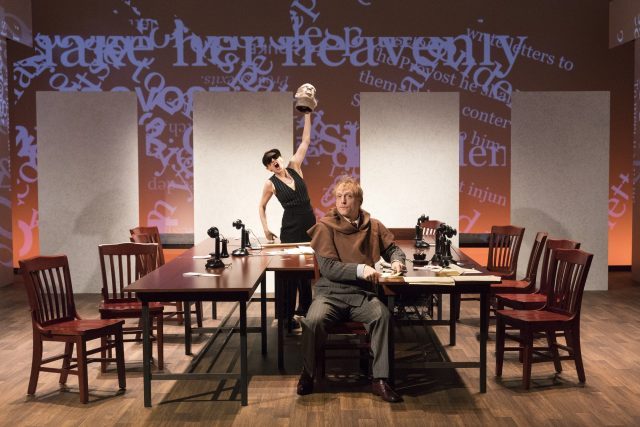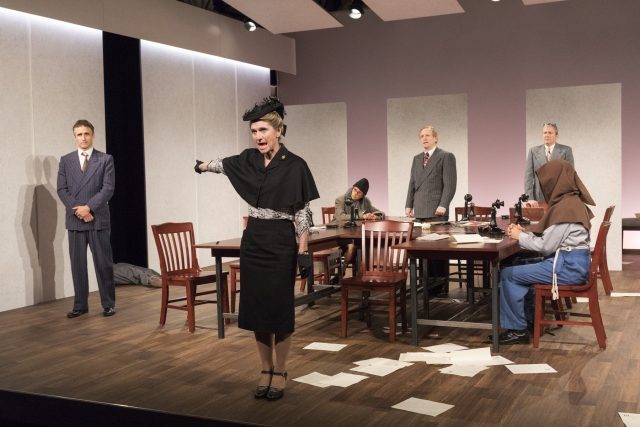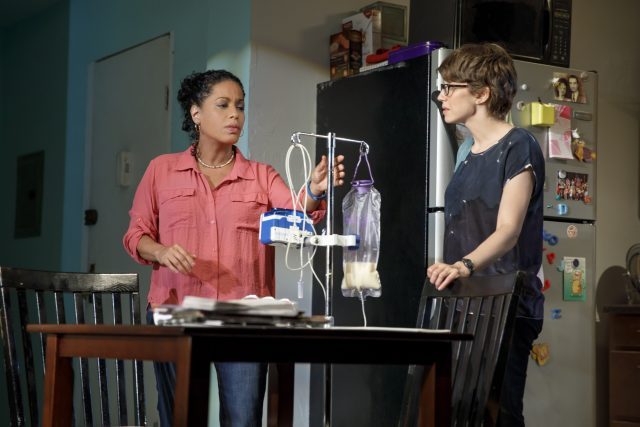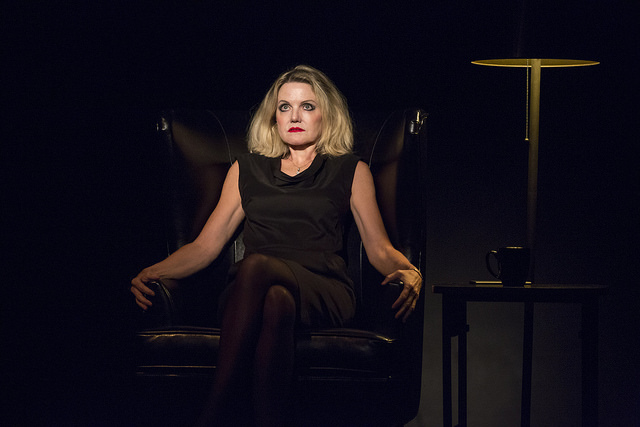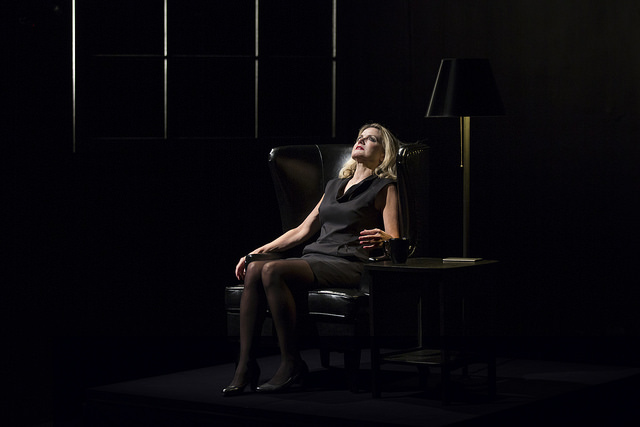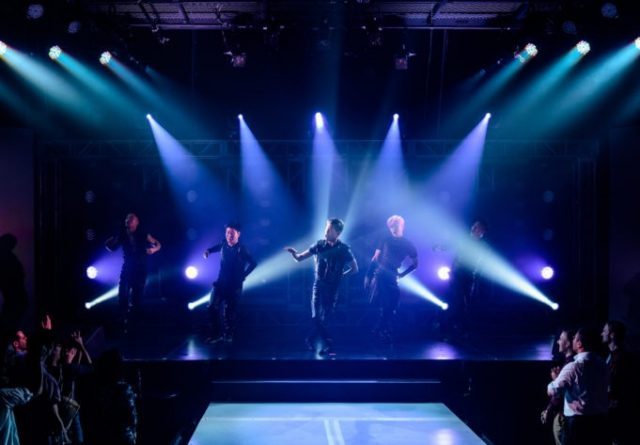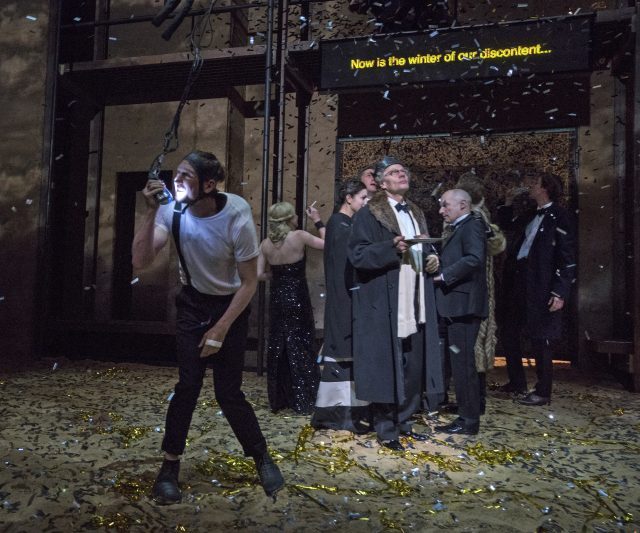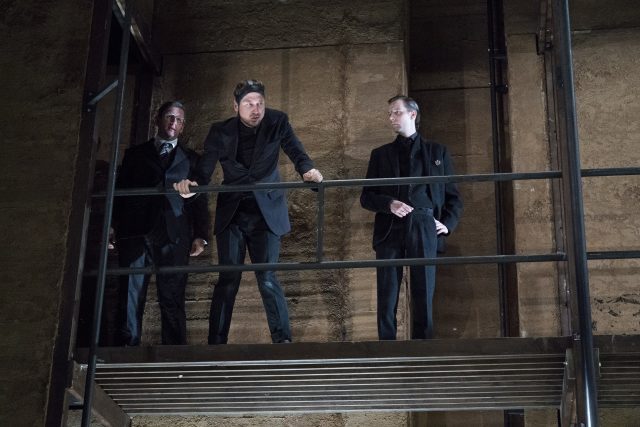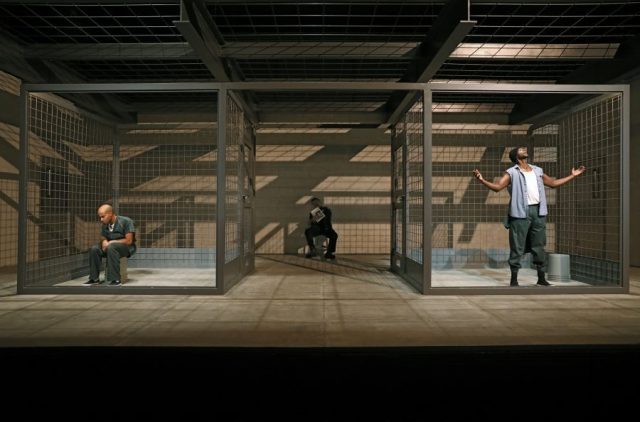
Prison guard Valdez (Ricardo Chavira, center) calmly reads as Angel Cruz (Sean Carvajal, left) and Lucius Jenkins (Edi Gathegi, right) consider their fate in Stephen Adly Guirgis’s Jesus Hopped the ‘A’ Train (photo © 2017 Joan Marcus)
The Pershing Square Signature Center
The Irene Diamond Stage
480 West 42nd St. between Tenth & Eleventh Aves.
Tuesday – Sunday through November 19, $30 through November 12, $45 after
212-244-7529
www.signaturetheatre.org
With the U.S. incarceration system under increasing scrutiny and as talk of closing down the infamous Rikers Island jail grows, the time is ripe for the first New York City revival of Stephen Adly Guirgis’s 2000 play, Jesus Hopped the ‘A’ Train, and a blistering version opened last night at the Irene Diamond Stage at the Signature Theatre. The play is not an activist exposé of the penal system as much as a searing journey into the battle for the soul of humanity, set in Rikers, pitting good vs. evil, light vs. dark, God vs. the Devil, and guard vs. inmate. Edi Gathegi is electrifying as Lucius Jenkins, a serial killer whom we see only during his one outdoor hour a day, caged in the prison yard, where the sun beats down on him as he madly exercises and spouts off like a man in heat, with an opinion about everything, from television to cookies to the surgeon general. But soon friendly, sympathetic guard Charlie D’Amico (Erick Betancourt) is replaced by the more vicious and condescending Valdez (Ricardo Chavira), and Lucius gets a new neighbor.
“People think everything is replaceable. Everything is not replaceable,” Valdez explains. “People believe they go through life accumulating things. That is incorrect. People go through life discarding things, tangible and intangible, replaceable and priceless. What people do not understand is that once they have discarded an irreplaceable item, it is lost forever.” Joining Lucius for the daily sixty minutes away from their twenty-three-hour lockdown is Angel Cruz (Sean Carvajal), a thirty-year-old man arrested for shooting the Reverend Kim in the butt; he believes the minister is a cult leader who kidnapped and brainwashed his best friend. Angel is not initially cool with his court-appointed public defender, Mary Jane Hanrahan (Stephanie DiMaggio), but she takes an interest in his case even after he admits to her that he did it, setting up a potential serious ethical violation. With Angel’s trial and Lucius’s extradition to execution-happy Florida looming, the characters discuss faith, the existence of God, the law, and time, which is running out on both of them.
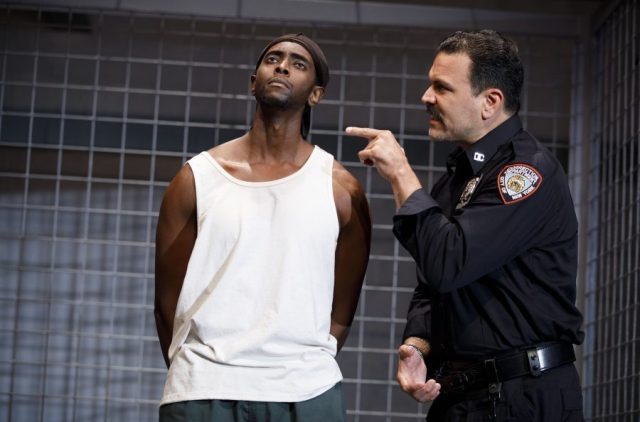
Lucius Jenkins (Edi Gathegi) gets an earful from prison guard Valdez (Ricardo Chavira) in Stephen Adly Guirgis revival at the Signature (photo © 2017 Joan Marcus)
Without getting pedantic or simplistic, Pulitzer Prize winner Guirgis (Between Riverside and Crazy, The Little Flower of East Orange) explores many basic dichotomies in Jesus Hopped the ‘A’ Train, from the names of the two men in prison, Angel (a celestial being) and Lucius (the son of the devil), to a brief discussion of two kinds of Oreos, chocolate fudge and vanilla fudge. (Also, while Lucius worships the sun, Angel shot a man based on the Reverend Sun Myung Moon where the sun don’t shine.) Obie winner Mark Brokaw (Heisenberg, The Lyons) directs with a strong but understanding hand, giving room for the actors to intersect with Guirgis’s sharp language. Riccardo Hernandez’s set, boldly lit by Scott Zielinski, features a pair of cells a few feet apart, surrounded by concrete blocks, the cages open at the front not only to give the audience a clearer view inside but to imply that anyone can end up there. In his off-Broadway debut, Gathegi (Two Trains Running, Superior Donuts), stepping in for the originally announced Reg E. Cathey, is a whirlwind of energy as Lucius, constantly on the move, exercising, climbing up the cage, lifting his arms defiantly, and throwing matches and cigarettes over to Angel; he doesn’t just speak his lines but he lives every word. Carvajal (Seven Spots on the Sun, Tell Hector I Miss Him), who took over for Victor Rasuk just before previews began, still needs to find his sea legs as Angel, who spends much of his time sitting in a chair or on a bucket or kneeling in prayer; his emotional shifts from scared to brazen jump around too much, as if he is playing two different characters, but when he hits the right stride, he nails it.
Chavira (A Streetcar Named Desire, Guirgis’s The Motherf**ker with the Hat) portrays Valdez with just the right amount of high-minded privilege because he’s not the one behind bars. When Lucius starts talking about the vibe of these daily workout sessions, Valdez responds, “Oh . . . well, let me, if I may, tell you now about my vibe, my feel. My ‘vibe’ is: Step away from that cage before I come in there and club you to death.” Chavira delivers the lines in a way that makes everyone in the audience lean back in their seat and take notice. DiMaggio (A Free Man of Color, Exile) and Betancourt (Julius Caesar, Guirgis’s The Last Days of Judas Iscariot) each gets to deliver a soliloquy at opposite sides off the stage, their characters the only ones not tied down to Rikers. Jesus Hopped the ‘A’ Train, which was originally directed by Philip Seymour Hoffman in 2000 with a cast consisting of Elizabeth Canavan, Salvatore Inzerillo, Ron Cephas Jones, John Ortiz, and David Zayas, is an exciting beginning to Guirgis’s Signature Residency, which continues next May with his 2002 play, Our Lady of 121st Street, directed by Anne Kauffman, followed in 2018-19 by a new work.
